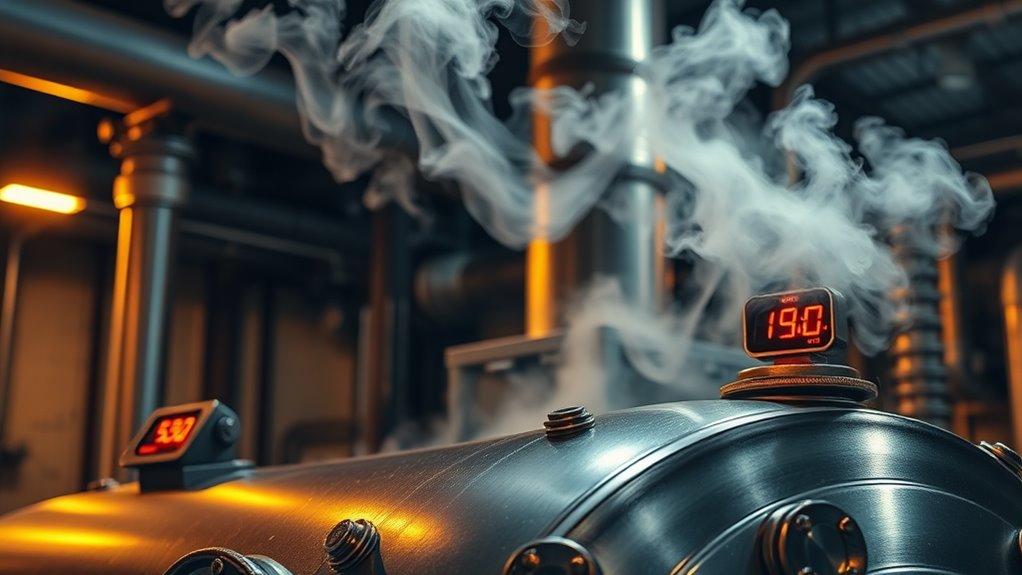Commercial boilers typically operate within a temperature range of 140°F to 200°F. This range is essential for ensuring ideal efficiency and safety. If temperatures exceed these limits, you risk not only reduced performance but also potential hazards like overheating or equipment failure. Effective temperature management reduces energy costs and extends boiler lifespan. Understanding the factors affecting these temperatures is critical for safe operation. Explore the key considerations to enhance your boiler's reliability and efficiency.
Key insights
- Commercial boilers typically operate within a temperature range of 140°F to 200°F for optimal efficiency.
- Operating temperatures outside this range can lead to decreased efficiency and increased maintenance costs.
- High operating temperatures pose risks such as equipment failure and safety hazards, including explosions.
- Effective temperature management reduces fuel consumption and enhances system reliability.
- Regular maintenance and monitoring are essential to prevent overheating and ensure safe operation.
Understanding Commercial Boiler Temperature Ranges
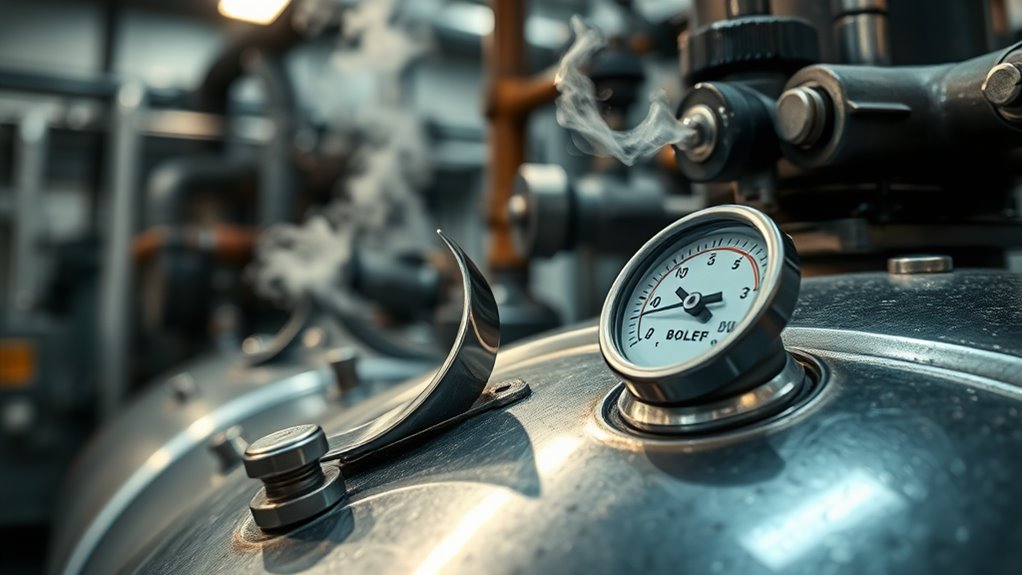
When you consider the operation of commercial boilers, it is important to understand the temperature ranges they typically operate within. Most commercial boilers function efficiently between 140°F and 200°F. This range is essential for maintaining optimal boiler efficiency while preventing overheating. To monitor performance accurately, you'll rely on temperature gauges, which provide real-time data on operational heat levels. These gauges help guarantee your system remains within the desired range, preventing energy waste and potential damage. Operating outside these limits can lead to decreased boiler efficiency and increased maintenance costs. Therefore, familiarizing yourself with these temperature ranges and their implications is crucial to achieving reliable and efficient boiler performance in your facility. Regular commercial boiler service helps ensure that your boiler operates within these recommended temperature ranges, further enhancing its efficiency and longevity.
Factors Affecting Boiler Temperature
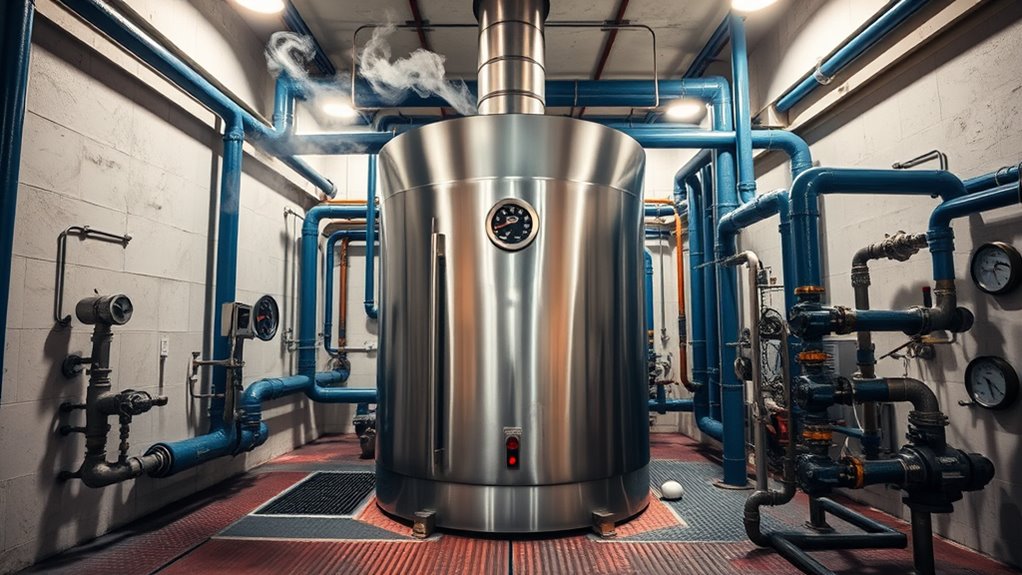
Several factors influence the temperature of commercial boilers, impacting their overall performance and efficiency. First, the fuel type used can greatly affect combustion efficiency, altering the heat output. Second, the boiler design plays an essential role; systems designed for higher thermal efficiency often maintain ideal temperatures more effectively. Third, the water quality directly impacts heat transfer rates; impurities can lead to scaling, reducing efficiency. Additionally, effective temperature control mechanisms, such as thermostats or modulating burners, guarantee that the boiler operates within the desired range, preventing overheating or underperformance. Finally, the load demand on the boiler must be considered, as fluctuations can lead to variations in temperature, impacting overall boiler efficiency. Regular maintenance is crucial for ensuring optimal performance and preventing potential issues that could affect temperature regulation.
Risks of High Operating Temperatures
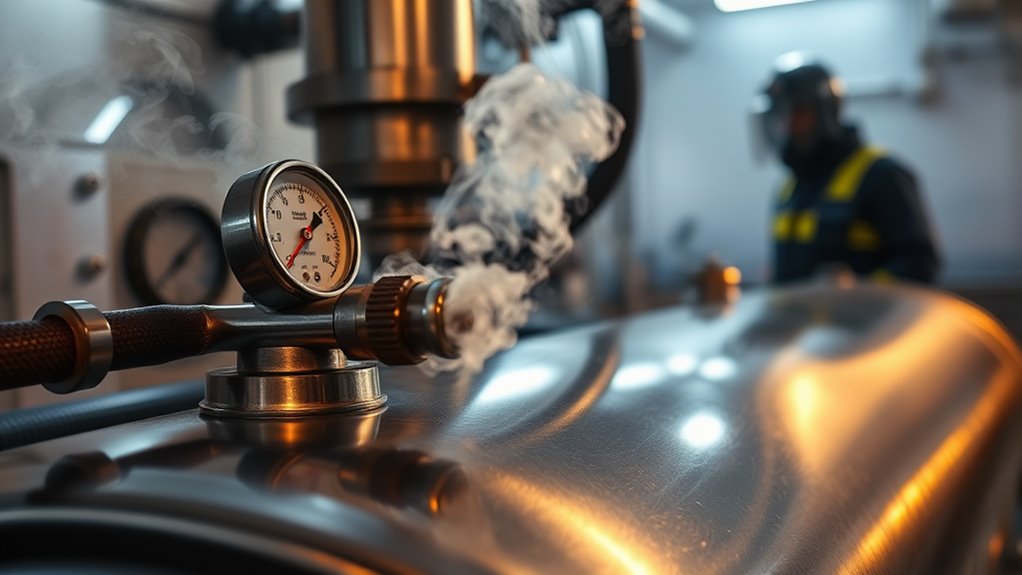
High operating temperatures in commercial boilers pose significant risks that can compromise both safety and efficiency. Boiler overheating can lead to catastrophic failures, including explosions or structural damage. Elevated temperatures strain components, accelerating wear and tear, which can result in costly repairs and downtime. Moreover, improper temperature regulation can exacerbate these issues, creating dangerous operating conditions. Over time, persistent overheating may also decrease energy efficiency, leading to higher operational costs. Regular maintenance and monitoring are vital to prevent these risks. Implementing temperature regulation systems helps maintain ideal performance and safety, ensuring that your boiler operates within its designed temperature range and minimizing the potential for hazardous incidents. Prioritizing these measures is essential for safe and efficient boiler operation, as regular maintenance ensures compliance with safety regulations and mitigates risks associated with high-pressure systems.
Benefits of Optimal Temperature Management
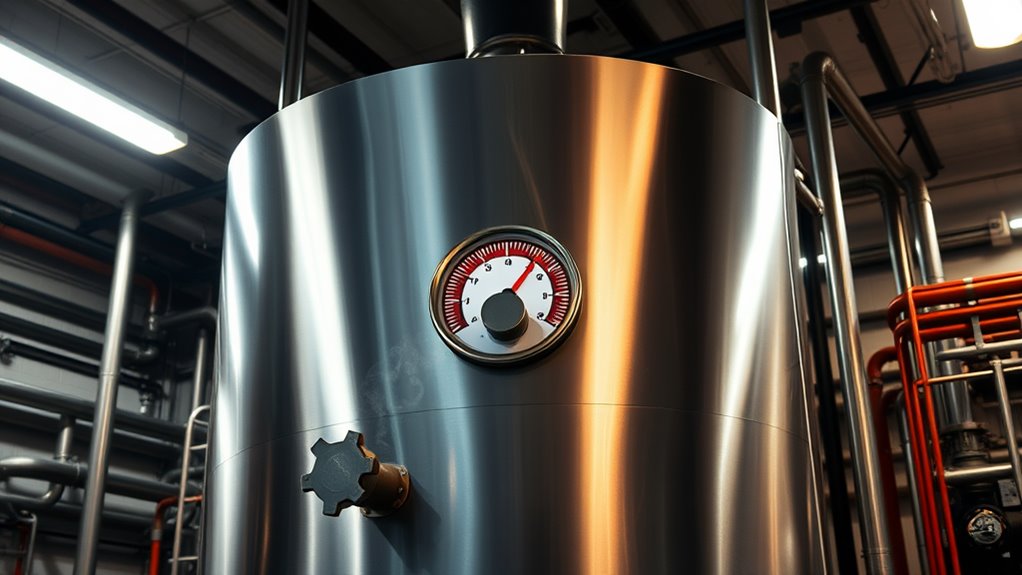
Maintaining ideal temperature management in commercial boilers offers numerous advantages that enhance both safety and operational efficiency. By implementing effective temperature control, you can maximize energy efficiency and minimize risks associated with overheating.
- Reduces fuel consumption, leading to lower operational costs.
- Extends the lifespan of boiler components through reduced wear.
- Improves overall system reliability, decreasing downtime.
- Enhances workplace safety by minimizing the risk of overheating incidents.
- Additionally, proper temperature management aligns with energy-efficient heating systems, contributing to reduced carbon footprints and lower utility bills.
Maintenance Tips for Safe Boiler Operation
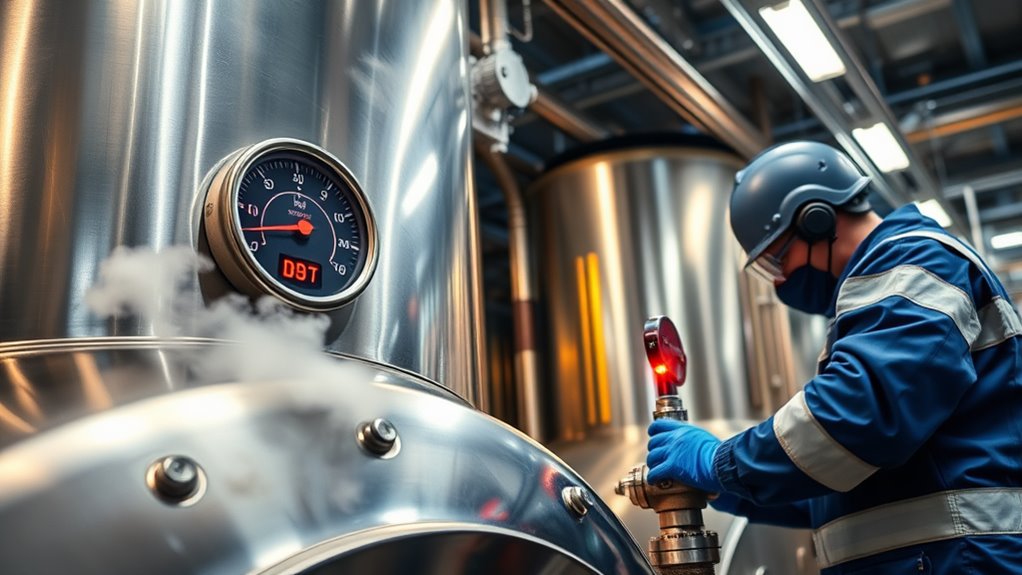
While you might think that regular check-ups are sufficient for boiler safety, proactive maintenance is crucial to secure safe and efficient operation. Schedule routine boiler inspections to identify potential issues before they escalate. Keep a close eye on temperature monitoring systems; they're critical for detecting overheating or inconsistent performance. Confirm that safety valves and pressure gauges function correctly, as they protect against dangerous malfunctions. Regularly check and clean burner assemblies to maintain ideal combustion conditions. Additionally, inspect water levels and treatment chemicals to prevent scale buildup. By following these maintenance tips, you'll enhance the longevity and reliability of your boiler while securing a safe working environment for you and your team. Prioritize these practices to mitigate risks effectively. Furthermore, obtaining a Commercial Gas Safety Certificate is essential for validating safety inspections and ensuring compliance with gas safety regulations.
When to Seek Professional Assistance
If you notice any irregularities in your boiler's performance, such as sudden temperature fluctuations or unusual noises, it's vital to seek professional assistance immediately. Ignoring these boiler malfunction signs can lead to more severe issues and costly repairs.
Consider reaching out for a professional inspection if you experience:
- Inconsistent heating throughout your space
- Leaks around the boiler or connecting pipes
- Increased energy bills without a clear reason
- A persistent error code on the control panel
Timely professional inspection is imperative for identifying underlying problems and guaranteeing your boiler operates efficiently and safely. Remember, addressing these issues sooner rather than later can prevent further complications and provide a reliable heating system for your business. Regular maintenance and servicing can also help prevent boiler errors and keep your system running smoothly.
Frequently Asked Questions
What Materials Are Commercial Boilers Typically Made From?
When considering what materials commercial boilers are typically made from, you'll find that they often feature steel construction. Steel offers durability and strength, which are essential for withstanding high pressures and temperatures. This material not only enhances boiler efficiency but also guarantees longevity and reliability. Some boilers may incorporate additional materials like cast iron or stainless steel, depending on specific design requirements, but steel remains the primary choice for its balance of performance and cost-effectiveness.
How Long Do Commercial Boilers Usually Last?
Commercial boilers typically have a lifespan of 15 to 30 years, depending on usage and maintenance. To maximize your boiler lifespan, follow regular maintenance tips like checking for leaks, cleaning components, and scheduling annual inspections. You should also guarantee proper water treatment to prevent corrosion and scale buildup. By staying proactive about your boiler's care, you can enhance its efficiency and longevity, ultimately saving on replacement costs and guaranteeing reliable operation.
What Is the Average Cost of a Commercial Boiler?
The average cost of a commercial boiler varies based on capacity, type, and energy efficiency. Generally, you can expect to pay between $5,000 and $20,000 for boiler installation. Opting for high-efficiency models may have a higher upfront cost, but they save you money on energy bills over time. Evaluating your facility's needs and exploring various options will help you make a more informed decision on your investment in a commercial boiler.
Can Commercial Boilers Be Used for Heating Water?
Yes, commercial boilers can be used for water heating in various commercial applications. They efficiently generate hot water for heating systems, sanitation, or other processes. By adjusting the boiler's settings, you can achieve ideal water temperatures to meet specific demands. This versatility makes commercial boilers an excellent choice for businesses requiring reliable hot water solutions. Just make certain your system is appropriately sized and maintained for maximum performance and efficiency.
What Safety Features Should Commercial Boilers Have?
When considering safety features for commercial boilers, guarantee they comply with safety regulations. Key features should include an emergency shutoff system, which allows immediate cessation of operation in case of a malfunction. Additionally, pressure relief valves, low-water cutoffs, and proper ventilation systems are essential to prevent accidents. Regular inspections and maintenance also play a significant role in making certain these safety mechanisms function effectively, protecting both personnel and equipment from potential hazards.
Summary
In conclusion, understanding the temperature ranges of commercial boilers is essential for safe and efficient operation. By recognizing the factors that influence these temperatures and the risks associated with high operating levels, you can effectively manage your boiler's performance. Prioritize ideal temperature management and regular maintenance to guarantee safety and reliability. If you notice any irregularities, don't hesitate to seek professional assistance. Staying proactive will help you avoid costly issues and keep your boiler running smoothly.

